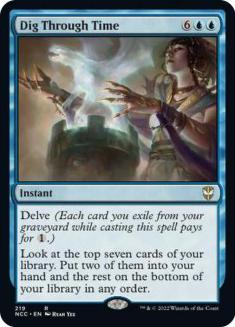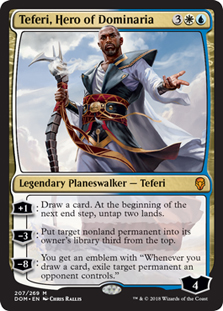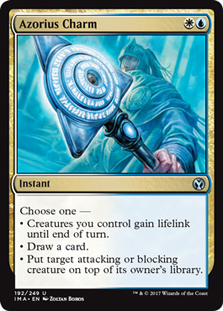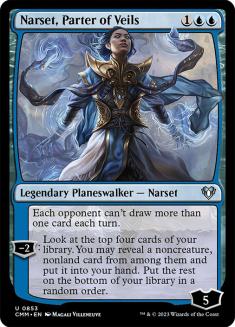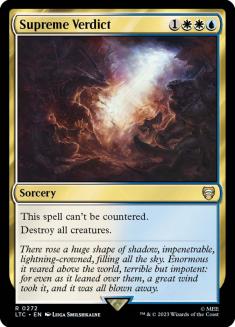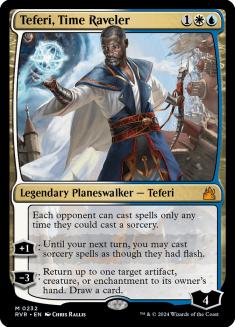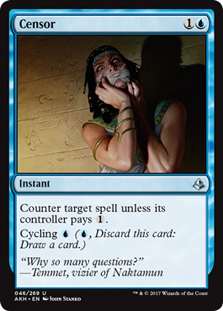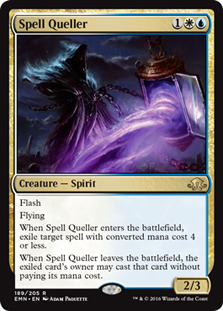Control has had tough sledding in competitive formats over the last few years. Between the continuous increase in creature power level and the narrow window removal, counterspells, and card draw have, other archetypes have dominated. This was the new status quo until the release of Pioneer.
Pioneer has resuscitated control’s format dominance, as Dig Through Time and powerful planeswalkers remain legal. There is always a chance we will wake up one Monday to find our flagship card draw spell ripped from our arms, and then we must find a way to manage with Sphinx’s Revelation. I continue to hope that day will not come; however, deep down I know it will. In the meantime, let’s take a look at a wonderful list drafted up in Gerry’s most recent article and discuss the state of Azorius Control in Pioneer.
Planeswalkers (8)
Lands (25)
Spells (27)

I’ve discussed the pros and cons of Azorius Control to Esper Control in Pioneer in a previous article. There are many circumstances when piloting Esper Control where the mana does not fully cooperate, leading to unnecessary difficulties when heavily favored to win. The reason for my advocacy of Esper Control isn’t the typical bias you would see from me, but because of the insistence of showcasing Thoughtseize, Fatal Push, Liliana the Last Hope, and better sideboard cards than the competitors. It turns out that all these cards are overpowered for Pioneer, but the consistency cost isn’t negligible. The million-dollar question was, can Azorius Control dominate the format with a weaker set of spells? The answer, through rigorous testing on my own, is “kind of.”
That isn’t the typical answer you would expect out of a strategy article, but hear me out. At this point in Pioneer, Azorius Control wears the crown and is the best deck in the format. The reason that this is not a slam-dunk case is due to the fragility of that number-one spot. Control cards in Pioneer are top-notch and each banning hit the top hunters that historically feasted on the slower archetypes.
Prior to each card banning in Pioneer, I was performing very well with Esper Control. The aforementioned black spells enabled Esper Control to stay ahead of the pack against the fastest of aggro decks; disrupted the midrange decks that summoned the power of Oko, Thief of Crowns; and was able to protect Liliana, the Last Hope to her inevitable ultimate against the ramp decks. The pieces fell together then, if the mana cooperated. Now, with all the top decks slashed to pieces by the DCI, the might of Esper Control may not be needed.
The control alternative is Azorius Control and Gerry did a great job providing a primer for it. This article will be a follow-up of sorts. Although it is currently the top deck, there are other strategies that can exploit the weaker payload that Azorius Control utilizes. At this point, the decks being championed do not have what it takes to dance with control of any configuration in Pioneer. I hate to provide valuable information like this to the enemy; however, it is important that control enthusiasts know what their weaknesses are when sleeving up a deck like this. The other important piece of information to take away is how to adapt.
The early-game of Azorius Control would be a bit embarrassing if the format were to speed up to the velocity it is capable of. There are still many Elves that produce resilient threats, very quickly. When the removal is based completely on attackers, early planeswalkers and creatures that produce value without having to attack become problematic. There are a few decks out there that love to summon Goblin Rabblemaster and/or its pal Legion Warboss on Turn 2. This series of plays can be a complete knockout against a deck that is dependent on Supreme Verdict to physically clear the battlefield of aggressive threats. This is where Fatal Push is missed, and Azorius Charm doesn’t cut it.
Against early planeswalkers, the Azorius Charm response doesn’t do much. With Oko, Thief of Crowns banned, there hasn’t been a great deal of chatter about green decks that were left lacking with its departure. There are plenty of other ways to torment a control player who has fragile, limited outs to resolved planeswalkers. When the game goes on for a bit, Teferi, Hero of Dominaria can handle business quite well. The issue hits home hard when Turn 2 or Turn 3 is on the table. This could be anything from a Nissa, Voice of Zendikar to a Liliana, the Last Hope. The ability for decks to speed them out, or push them through with disruption, makes a deck with weak disruption in the early-game vulnerable. This isn’t news to Gerry or other fans of the archetype, as they have resigned themselves to this.
The format is currently slow, which is why you see them flaunt their four copies of Absorb. This couldn’t occur in a format where players are off to the races very early on. Weaknesses in the early-game are only an issue if players take advantage of it. If Pioneer remains dominated by midrange decks and the format doesn’t speed it up, Azorius Control has nothing to worry about. Unfortunately for the control team, this is never the case with competitive formats. They will adapt, through bans and/or ingenuity, and make a deck like this fall hard from its top spot.
I really like the changes Gerry made to the typical Azorius Control decks that were floating around. Sphinx’s Revelation is no good and the deck desperately needed multiple copies of Blessed Alliance. In the comparison I mentioned, there is no world where Azorius Control can compete without additional removal on Turn 2. Additional planeswalkers help win clashes against grindier decks that can outlast control decks with limited threats. Narset, Parter of Veils and Teferi, Time Raveler are must-haves, and the number of Teferi, Hero of Dominaria is perfect. When players add four Opt to their control decks, there’s an urge to skimp on the threats. Azorius Control must pull aggression to its planeswalkers in order to call down a clean Supreme Verdict. With that type of burden on the Azorius sweeper, there are bound to be blowouts once enemy deckbuilders catch wind of it.
Unbreakable Formation has already seen play in white aggressive decks I’ve faced in some Magic Online testing. Even though Mono-White Aggro isn’t lighting up the charts, it is still a plausible scenario that annihilates an unsuspecting Azorius Control wielder. I also faced a few decks with Heroic Intervention in my digital travels. This spell has made its way into many green-based aggro decks and has walloped me on a few occasions already. There are other cards that have a similar effect, but these are the two that I have had experience against in the last few weeks.
There are other, supplemental sweepers, like Settle the Wreckage, that can take some of the pressure off Supreme Verdict. The biggest problem with this strategy, though, is that Supreme Verdict is much better on average, making a split between the two not cost-effective. In most of my control decks, I am playing four Supreme Verdict and one Settle the Wreckage. Since most of these punishing indestructible cards come from the sideboard, the additional copies of Settle the Wreckage could come in for Game 2 and Game 3.
As Azorius Control continues to get endorsements from some of the best in the world, these types of modifications will take place. Competitive players will make sure that their Azorius Control matchup is strong, which means they will have a way to neutralize Supreme Verdict.
As Pioneer speeds up and adapts to Supreme Verdict, some of the other pieces of Gerry’s list need amendment. The manabase and planeswalkers are almost perfect, with some tweaks coming to the spell suite and sideboard. The format is changing rapidly, and the top-tier status of Azorius Control will not go unchallenged. With these changes, I think it has a better shot of retention.
Planeswalkers (9)
Lands (25)
Spells (26)

The changes I’ve made come from testing, as well as projecting the trajectory of Pioneer in the coming weeks. With the potential rise of problematic spells to answer the now-best deck Azorius Control, there are some painful moves that must be made. I love a good three-mana counterspell as must as the next person, but four Absorb cannot be in the starting lineup for any control deck. Even in Standard, where the power and speed drop significantly, Absorb fell from favor, not just because of the weakness of being on the draw with this clunker in hand on Turn 3 but due to Teferi, Time Raveler being in the format.
Teferi, Time Raveler will see extensive play in all competitive formats if people are allowed to play it. This presents a problem for all counterspells, however; three-mana options carry a much higher risk. Dovin’s Veto can get under it easily and Censor can cycle, which are huge advantages at present. I am still using two Absorb in this list but I’m not sure how long that will last. It can swing a game against some Mono-Red Aggro opponents, as well as hit any threat against the control mirror or midrange foe. With card selectivity like Dig Through Time, we can afford to diversify our disruption to best avoid slow starts and shutdown planeswalkers.
Censor was one of the big additions to Gerry’s deck and I increased it to three copies for reasons I mentioned earlier. Azorius Control is still actively trying to fill the graveyard for an easy Dig Through Time. Without Fabled Passage, card cycling is a very important fuel to that fire. Syncopate has been worse multiple times in testing and I feel the need to counter any spell an opponent drops on Turn 2. Gerry mentioned the crutch of Supreme Verdict that this deck heavily leans on. There are many games decided by the Azorius Control player’s ability to interact prior to that Turn 4. Censor and Azorius Charm allow for that, with the alternative ability to cycle. This has provided me many Dig Through Time opportunities earlier than most Azorius Control lists provide.
The increased emphasis on Turn 2 interaction prompted my cut of Search for Azcanta and Cast Out. Search for Azcanta is something nice to have in the opening hand most of the time, where I had the opportunity to cast it or save up for a Turn 4 two-spell moment. When drawn later, or when I was unable to free up resources until later in the game when drawn early, I wished it was a Dig Through Time. Two copies of the best card draw spell in the format is tough, especially when I would prefer not to Opt for it early. Having three copies allows for better game flow and preparation, making the swap an easy one. The Cast Out turned into a Censor for the same interaction principle.
Overall, my main deck strategy doesn’t differ from Gerry’s much. I strengthened the two-drop slot while weakening the counterspell strength. I make up for win percentage drop in the mirror with a third Dig Through Time and the backbreaking fourth Teferi, Time Raveler. I have learned my lesson with the Teferi, Time Raveler count in Standard. Since it is such a vital piece of the gameplan and carries little downside in multiples, four is the correct amount moving forward in Pioneer. Turning off all counterspells against a control opponent makes the game tough to lose and it is helpful against any deck that doesn’t have an abundance of one-drops.
The sideboard had a few shifts, but I really liked the direction Gerry took Azorius Control in with Spell Queller. It has been great against so many decks and is a refreshing option when Supreme Verdict isn’t needed. I cut a few of the one-ofs in favor of the life gain package and an additional Settle the Wreckage. Since Azorius Control has exploitable flaws in speed and is at the top of the format currently, these changes are required to stay one step ahead. I appreciate my colleagues’ work on this and look forward to control keeping the title.

